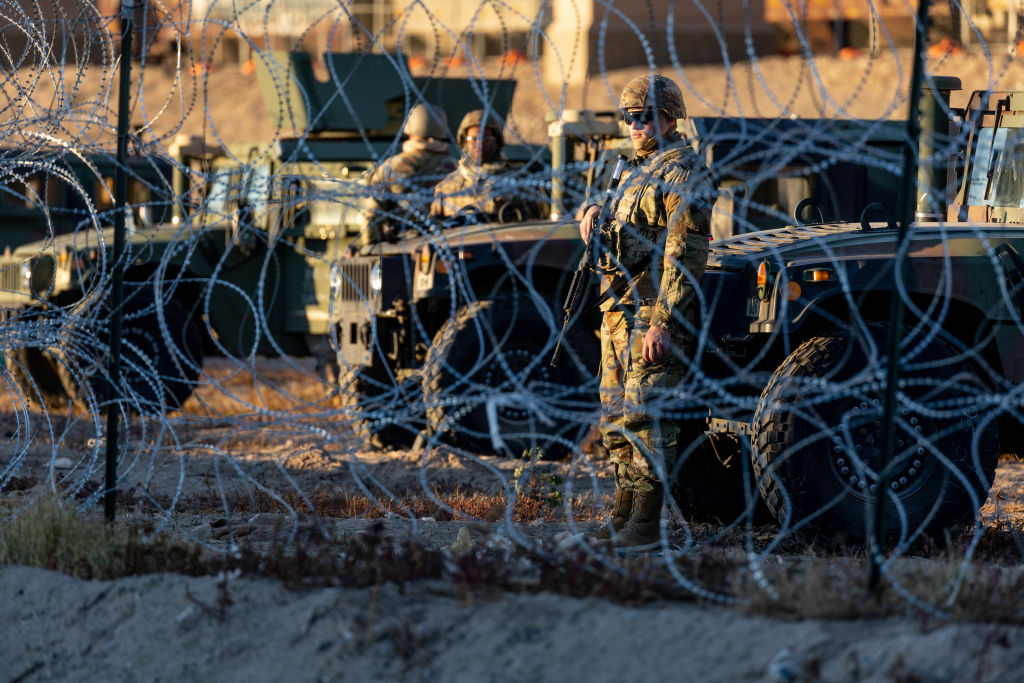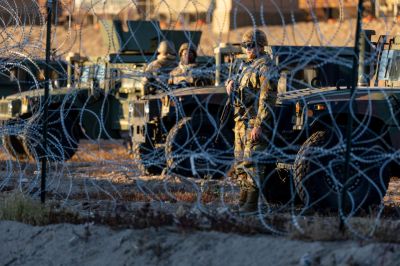The U.S. Customs and Border Protection has witnessed over 6 million migrants entering the United States from the southern border under the Biden administration, and a large percentage of them are coming through Texas.
In response, the state’s Republican governor, Greg Abbott, has taken matters into his own hands. In March 2021, he launched Operation Lone Star, a multi-faceted mission to stop illegal immigration along the Texas border. Now, President Joe Biden and his administration argue barriers the state has erected along the border as part of Operation Lone Star infringe on federal authority. Enforcing border regulation typically falls on federal authorities.
The Biden administration has accused Abbott of dehumanizing immigrants and making it harder for federal Border Patrol agents to do their jobs. Abbott claims Biden isn’t doing his job to protect the southern border from foreign “invasion,” and that while constitutional authority gives him the right to maintain the barriers, Biden’s claim over national border authority rests on historic precedent.
The fight has included standoffs at the border and tit-for-tat legal filings.
What have legal fights been over?
Last July, Abbott installed a 1,000-foot floating barrier in the Rio Grande near Eagle Pass, Texas, prompting a federal lawsuit from the Biden administration. The lawsuit claimed Abbott installed the barrier without necessary federal authorization. Abbott later stated, however, that the barriers directed migrants to appropriate border entry points and prevented the illegal transfer of drugs, weapons, and people into the country. In September, U.S. District Judge David A. Ezra ruled that Texas must remove the floating barrier.
Rather than remove the barrier, Texas immediately appealed to 5th Circuit Court of Appeals, which affirmed the lower court’s ruling and ordered Texas to remove the floating barrier. The battle against Operation Lone Star, however, continued on other fronts.
In October, Texas Attorney General Ken Paxton sued the U.S. Department of Homeland Security (DHS) in district court and accused Border Patrol agents of cutting, damaging, and destroying a razor wire fence Texas had established to secure the border and prevent illegal immigration. While Paxton described the removal in his lawsuit as “without any justification,” the Biden administration countered that the wire impeded Border Patrol agents from safely performing their duties.
The district court granted Paxton an emergency restraining order to stop federal agents from destroying the wire. On December 19, a 5th Circuit judge issued the state of Texas an injunction to prevent federal agents from interfering with the wire fence while the case was pending. This injunction did, however, allow an exception for cases constituting medical emergencies.
On January 2, DHS filed an emergency application to the U.S. Supreme Court requesting it freeze the 5th Circuit’s injunction. DHS argued that newly erected barriers prevented agents from performing their jobs by blocking their access to Shelby Park, a city park in Eagle Pass. A border patrol chief patrol agent, Robert Danley, stated that without access to a certain boat ramp in Shelby Park, federal agents could not respond to distressed migrants in the area.
“Texas has the legal authority to control ingress into any geographic location in the state of Texas,” Abbott said at a news conference on Friday, January 12.
Later that day, a woman and her two children drowned near the boat ramp Danley described. Three days later, DHS filed a memorandum to the Supreme Court stating that if the Border Patrol had retained its original access to the park, its agents may have been able to rescue the three drowning migrants. The White House also blamed Texas officials for the deaths. Paxton called the loss of life in the Rio Grande tragic, stated that the fencing was established to prevent loss of life in the area, and claimed that the fence deters illegal crossing by routing migrants to safe and lawful entry ports.
On January 14, the Texas Military Department released a statement following its review of the circumstances and concluded that the migrants had already drowned by the time Border Patrol agents requested access to the site of the tragedy.
In a 5-4 vote on January 22, the Supreme Court used a shadow docket—a procedure which can be employed in cases requiring immediate action—to lift the 5th Circuit’s injunction which had blocked border patrol agents from destroying the barriers. The move allowed federal agents to remove state-erected barriers.
The 5th Circuit will hear arguments on February 7 regarding whether Border Patrol agents violated Texas law by cutting the razor-wire barrier, one of the key claims of Paxton’s lawsuit against DHS.
What’s next?
Republican Rep. Chip Roy of Texas and others say Gov. Abbott has a constitutional obligation to defy the Supreme Court’s ruling. “This opinion is unconscionable and Texas should ignore it on behalf of the [Border Patrol] agents who will be put in a worse position by the opinion and the Biden administration’s policies,” Roy tweeted.
In fact, the one-page Supreme Court order does not prohibit the erection of additional barriers, but simply allows Border Patrol agents to destroy barriers when necessary.
Still, some Democrats have called on Biden to seize the Texas National Guard. “Abbott is using the Texas Guard to defy a Supreme Court ruling,” former Rep. Beto O’Rourke wrote on January 24. “When Gov. Faubus did this in 1957, Eisenhower federalized the Arkansas Guard to ensure compliance with the law. Biden must follow this example of bold, decisive leadership to end this crisis before it gets worse.”
For now, a senior Customs and Border Protection official told Fox News on Friday that the Border Patrol is not planning to remove the razor wire except in emergencies. “If we need to access an area for emergency response, we will do so.”
In addition to the fencing dispute, DHS sued Abbott on January 3 on behalf of the state of Texas for recently signing a bill making illegal border crossings a state crime punishable by deportation, prosecution, or imprisonment. The suit argues that the bill is preempted by federal law, violates the Constitution, and should be declared invalid. “Under the Supremacy Clause of the Constitution and long standing Supreme Court precedent, states cannot adopt immigration laws that interfere with the framework enacted by Congress,” Associate Attorney General Vanita Gupta stated, calling the bill “clearly unconstitutional.”
Texas’ arguments may ultimately rest on the classification of the migrant crossings as an “invasion.” The upcoming court decision largely depends on the judges’ opinion of Abbott’s classification of the border situation as an “invasion.” The judges’ agreement with his terminology would make the governor more likely to win his case, and would also strengthen Paxton’s argument for his lawsuit.
The Supreme Court has never defined the word “invade.” However, under the Constitution, “invasion” has historically been interpreted to involve entry plus enmity—meaning illegal entry alone is insufficient to constitute an “invasion.”






Please note that we at The Dispatch hold ourselves, our work, and our commenters to a higher standard than other places on the internet. We welcome comments that foster genuine debate or discussion—including comments critical of us or our work—but responses that include ad hominem attacks on fellow Dispatch members or are intended to stoke fear and anger may be moderated.
With your membership, you only have the ability to comment on The Morning Dispatch articles. Consider upgrading to join the conversation everywhere.